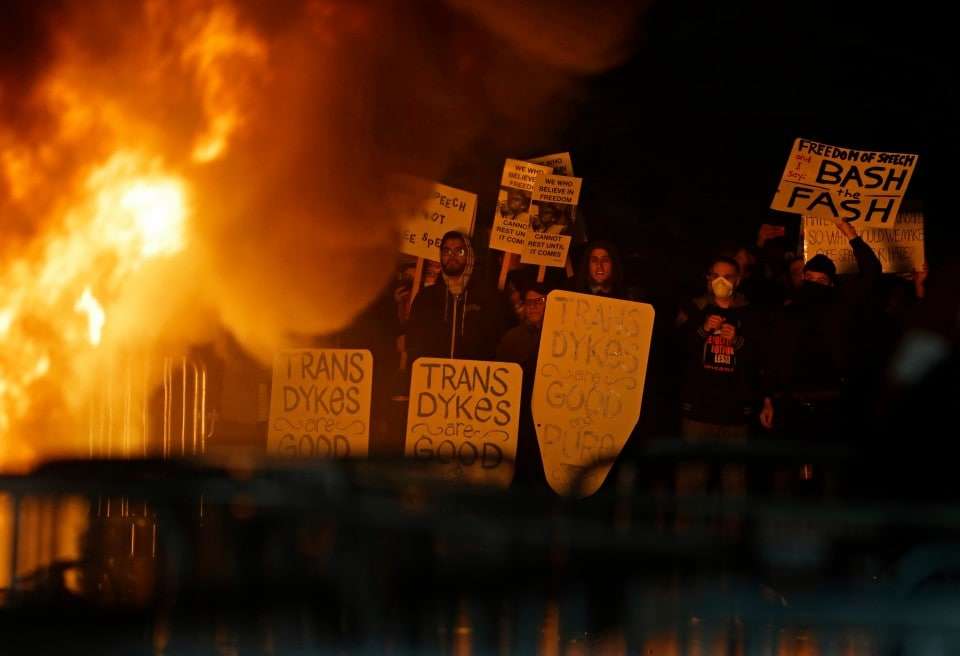The Volokh Conspiracy
Mostly law professors | Sometimes contrarian | Often libertarian | Always independent
Did Yiannopoulos secretly send more than 100 thugs to Berkeley to break up his own speech?

Last week, more than 100 masked thugs invaded the University of California at Berkeley campus and forced the cancellation of a speech by Breitbart News editor Milo Yiannopoulos. All credible reports have suggested that these thugs were not Berkeley students, but were instead outside anarchist agitators intent on keeping Yiannopoulos from speaking. For example, The Post had this description:
The demonstrators included "Black bloc" protesters, who wear masks and black clothing to present a unified front as they disrupt events, making it difficult for police to recognize individuals in the group. They are often seen at protests organized by groups such as Black Lives Matter and Occupy Wall Street, destroying property and setting fires. They torched a limousine in Washington last month on the day of Trump's inauguration, and a group spray-painted buildings and smashed electrical boxes during a demonstration in Portland, Ore., earlier in January. When a group of them arrived at Berkeley, it swiftly changed the tenor of the peaceful demonstration.
Some students organized to try to protect the campus and businesses nearby, and then to pick up broken glass, scrub graffiti off buildings and clean the campus after the violence.
William Morrow, president of the Associated Students of the University of California, said in a statement that the cleanup effort showed what Berkeley students care about. "Last night was not reflective of that," he said; students were expecting a peaceful protest, an exchange of opinions and a dance party, "but outside agitators infiltrated our community and didn't treat it with the respect for our historic tradition of non-violence."
The agitators set fires and caused more than $100,000 in damage to the campus.
http://www.washingtonpost.com/video/national/intense-protests-rage-at-berkeley-over-milo-yiannopoulos-speech/2017/02/01/a8a28744-e8fe-11e6-903d-9b11ed7d8d2a_video.html
Now a different theory is being hypothesized by Robert Reich, the chancellor's professor of public policy at Berkeley and former labor secretary during the Clinton administration. Reich argues in Newsweek that the fact that Yiannopoulos was going to speak about federal funding to UC campuses and that the disruption quickly led to a question by President Trump over this funding show some sort of link:
Yiannopoulos wasn't asked about the content of the speech that was shut down. The conversation [on Fox News] focused instead on how Berkeley proved the point that the Left was ceding its right to federal grants by cracking down on free speech. …
Which raises the possibility that Yiannopoulos and Brietbart were in cahoots with the agitators, in order to lay the groundwork for a Trump crackdown on universities and their federal funding.
Thursday night on CNN, I said "I wouldn't bet against" that possibility. …
I don't want to add to the conspiratorial musings of so many about this very conspiratorial administration, but it strikes me there may be something worrying going on here.
I wouldn't bet against it.
Other commentators have raised similar speculations.
So let's see: Yiannopoulos, who is an outsider to Berkeley and generally unwelcome there, succeeds in secretly arranging for more than 100 thugs to assemble in this city and then invade the Berkeley campus and cause more than $100,000 in damage, all to create a pretextual motive for Trump to alter federal funding for the UC system. And Yiannopoulos manages to do this without a single one of the thugs spilling the beans and tipping off the fact that this violent criminal conspiracy is organized by Yiannopoulos, not his opponents.
To even describe the plot is to make clear how phantasmagorical the whole idea is. Occam's razor applies here. Or, as medical students are taught, when you hear hoofbeats, think horses not zebras. There is no way Yiannopoulos organized these protests, subjecting himself to serious criminal liability and placing the fate of his career on the sealed lips of more than 100 conspirators. Instead, the simplest explanation is the correct one: The persons responsible are left-wing anarchists, as the New York Times (among others) has described in this recent article.
The only thing that remains strange about the events last week is the fact that Berkeley police have proved so inept. While the police were praised for their "restraint" during the riots (and perhaps that praise was justified - I venture no opinion on riot-control tactics), they have been unable to now identify even a single one of these criminals. (Campus police arrested one person, from outside campus, for failing to disperse when ordered and two other persons, again outsiders to the campus, in an unrelated incident.)
The issue that demands attention is: How is it that after more than 100 thugs organized, well in advance, to invade the campus, and police were alerted to the risk of violence, again well in advance, no arrests were made the night of the attack? Indeed, in the days afterward, police following up (are they following up?) are unable to find any digital fingerprints or other pieces of evidence to begin prosecuting those responsible. To be sure, it is possible the attack was organized via the dark Web (i.e., Tor) or some similar sophisticated means of anonymous communication. But why are police so completely incapable of responding to such organized criminality? I'm not convinced we need new laws to address the violence. But if we want to find something "worrying" going on here, the utter inability of the authorities to hold anyone accountable for this dangerous assault - not only on campus facilities but also on free speech (discussed by Eugene here) - should be the focus of our concern.


Show Comments (0)